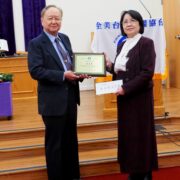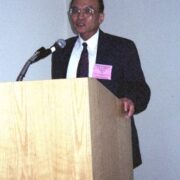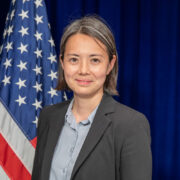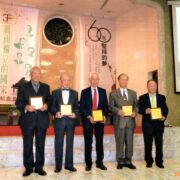Year 2001
Sue Shwu Lih Lin
It has been more than four decades since I immigrated to the United States. There were twists and turns along the way. With God’s blessing, I eventually sailed into a safe harbor. There are lots of things to write about. A few of them happened to occur in the year 2001.
I remember it was in the April of that year. I went to see an exhibition about Taiwan at the School of International and Public Affairs, Columbia University. On my way out, I noticed a stack of newspaper, “the Record, ” A front page article, titled “Tension between United States and China has been brewing for some time” The article focused on the recent collision between a U.S. navy intelligence plane and China’s fighter plane near Hainan Island. In an interview with the reporter, Professor Andrew Nathan, director of the graduate program in political science, pointed out that the alienation between the two nations has to do with different interpretation of the “One China Policy”
I did some internet search and learned that professor Nathan recently coedited a , yet controversial book, “The Tiananmen Papers” Meanwhile, I noticed an online forum, sponsored by Columbia University, “The Fathom,” in which Dr. Nathan made a thorough analysis of U.S.-China-Taiwan triangular issues: Four of them dealt with China’s political, military, and economic status under the global positioning of the United States, and the other three are about Taiwan’s political situation, independence issues, and the role of the United States. I quickly read them all. Thus, with “Your Works Deserve more Attention” as the subject, I wrote him an e-mail, and he replied very quickly.
What could have motivated my interest in the works of a Sinologist, such as Professor Nathan, given that I was not a journalist, neither in politics by profession ? The following account of my personal journey may be helpful in addressing this question.
A rebellious youth during high school, I took inspiration from icons such as Isadora Duncan, a modern dance pioneer, and a Taiwanese writer Li Ao, who rose to fame for his stirring thoroughly anti-establishment essays in the avant-garde magazine, “Wenxing.” At some point, I considered studying journalism or law, but eventually opted for the more conventional science/engineering discipline. After a bachelor’s degree in chemical engineering from National Taiwan University, I went abroad for graduate study with a focus on infrared spectroscopy, got married, and went to work. A few years down the road, after a master degree in chemical engineering, my daughter was born. Soon I joined companies engaging in the pioneering work of fiber optic communication technology, which enabled me to make some contribution in an enabling technology for the global communication network of today.
The sweet fruit turned bitter a few years later, when I became ill with cancer. It could not have happened in a worse time, because my father was just admitted for a surgery and passed away while I was about to start chemotherapy. It turned my life upside down and sent me on a course of reassessment for life’s priorities. Gradually, I rediscover my interest in subjects related to social science and humanities, and even started writing. Initially, I wrote about technology, feminism, or stock market, while the resolution to write a biography for my late father took shape. Finally, at the dawn of a new millennium, I could not wait any longer. I opened the encyclopedia of world history, trying to map the circumstances he endured in a larger stage. His life story was something we children grew up with and it had a profound impact on us. With a pen at hand, I revisited the turbulent history of the Island of Taiwan. It opened the scar of my childhood. However, it was essential that wisdom should triumph, not self-pity. With this in mind, I completed “Remembrance of my Father: Bereavement and Redemption,” an article of over five thousand words, the longest article I ever wrote up to that point. However, it was not clear to me what to write next. The idiom, “A storm should follow as the clouds are piling up” turned out to be quite fitting in my case.
At that time, my understanding of the cross-strait situation was very limited: The Cultural Revolution in China was well underway while I was in college. China was a country related to Taiwan in a hostile and tangled way. After finishing graduate school in the United States, I had the opportunity, through association with the Taiwanese compatriots community here, to revisit the history of Taiwan: for example, the 1947 massacre of Taiwanese people by the Chiang Kai-shek government, and issues related to Taiwan’s territorial claim by China. This type of awakening led to bitter division in people concerned with the matter, largely the community with varied degree of Chinese cultural influence. One camp advocates declaration of independence for Taiwan. The other urges eventual reunification with China. Those whose family retreated to Taiwan with Chiang-Kai-shek in the late 1940s, upon defeat by the communists in China, are often identified as one ethnic group, while the native Taiwanese identified as another. Since ethnical origin often influences people’s political conviction, ethnic labelling infiltrated interpersonal relation. Polarization in ideology is a phenomenon not unfamiliar in human history. Insistence on correctness is essential to win over supporters. Conclusion comes first, followed by collecting supporting evidence. It may be a smart way to attain media celebrity status. Consequently, people become more convinced of what they already believe in. We see only black and white, no gray area. This is the kind of atmosphere I was under for the first two decades of living overseas.
The discussion given by Professor Nathan impressed me with its neutrality in argument, yet offering well-informed perspective. As a Westerner, his mastering of the complexity of Taiwan-China relation was amazing in my opinion. In his analytical frame work, nations see things differently based on the respective historic experiences, cultural heritage, and self-interest. Thus, there is an inherent dilemma in international relation. My first exposure to the field of Sinology in this case affirmed my conviction that viewing ideological struggle with a degree of attachment is valid. In fact it freed me from the sense of outrage over the antagonistic community relation caused by clash between pro-unification and pro-independence activists. I was thankful that my inquiry to Professor Nathan had received his prompt reply.
Coincidentally, sometime in May 2001, I came across the other coeditors of the
“Tiananmen Papers,” Professor Perry Link of the East Asian Study department at Princeton University. It was during a rally organized by the Amnesty International group on the campus to show support for an alumni, Li Shaomin, who was detained ar by the communist government in Chia under suspicious circumstances. It occurred to me that Professor Link might also be present at this rally. So I made an inquiry to a Princeton Packard reporter standing next to me. He pointed his finger toward a tall, slim gentleman with serious manners standing not far away. Afterwards, I learned from internet search that his expertise is in Chinese language, literature and culture.
At the time, I was serving as the president of the “Windsor Area Taiwanese American Association” in the Princeton area. There was a sum of unused scholarship fund, with which the board decided to buy books and donate them to the public libraries nearby. After some research I made recommendation to purchase a series of novels jointly translated by Columbia University and the Taiwan Cultural Council: works such as “Three-legged horses”, “Thousands of rivers and thousands of moons, ” “Wild youngsters.”
What’s next? I thought of Professor Perry Link of Princeton University. He should be no stranger to the cross-strait literature landscape. In an urge to bring his attention to matters related to Taiwan, I carefully prepared an e-mail to him, mentioning the plan for a promotional seminar to highlight book donation to the local libraries. In his reply, he humbly expressed lack of in-depth knowledge in the literary field in Taiwan, but, instead, would recommend two speakers; Ms. Chen Chunyan, a lecturer in his department, Professor Jeffrey Kinkley of the history department at St. John’s University . I was very pleased that both speakers accepted the invitation. The meeting was set on October 6th, 2001.
These three professors are all graduated with a Ph.D degree from the Fairbank Center for Chinese Studies of Harvard University. I first heard about Professor Fairbank from my father as a child. In his autobiography ” China Bound: A Fifty Year Memoir,” Professor Fairbank accounted for the design of the Institute’s curriculum. Among them, “literature as a testimony to history” is a direction of research. Traditional research in history tends to focus on notable events, but ignores the long-term accumulation of forces calling for social change. Literature reflects microscopic social phenomena. So it can be where to turn for grasping the historical pulse. Professor Link’s “The Use of Literature,” and Professor Kinkley’s “The Odyssey of Shen Congwen,”illustrated just that. In the months leading up to the literature seminar, I applied considerable efforts in the study of modern Chinese history as if preparing for an examination. In addition to the above two books, I read “Evening Chats in Beijing, ”and “Random Notes by a half-Westerner.”The former is journalistic by nature, and the latter is social/political commentary with a Chinese focus. In contrary, “China’s Transition ” by Professor Andrew Nathan examined the political landscape in China. These work exemplified rigorous scholarship and exhibited panoramic views of the East and the West. Sometimes, by-standers can see things more clearly, as an idiom says. In this case, we may agree that insight from the West compliments those from the East.
The summer was soon over. In an unforgettable morning on September 11, the World Trade Center in New York was hit by a plane; followed, on the same day, by another plane attacking the Pentagon Building and a plane crash near Pittsburgh. In the common memory of all races at every corner of the world, the eternal image of a superpower turned into ashes in seconds. Evidences suggested that the plane which crashed near Pittsburgh may have been targeting the White House or the Capitol Hill. The scheme was aborted due to the joint resistance of several passengers on board. One of the heroes was Todd Beamer, a resident of my town Cranbury. I learned about it coincidentally when looking up a news release of the literature seminar by my organization in a local English newspaper. The report of a marble monument being erected in the heritage Park to honor Mr. Beamer appears at the same page of our news release.
The seminar, titled “Taiwan Experiences, Literature Focus, “took place on October 6, as planned. It is a very successful event. Personally, the entire process led to this event is a reckoning, which I later elaborated in an article, “On Becoming America, “published in the guest opinion column of “The Cranbury Press.”Preceding this English article, “Liberty Times,”a newspaper based in Taiwan, published “Another Generation Without Voice? “ , in which I traced the inspiration for donation of translated fictional books to the experiences of attending book discussion with local Americans in the Woman’s Club of Cranbury. The latter article is incorporated in “Random Notes from Princeton,”a semi-autobiographical book of essays. Several articles relevant to the experiences in the year of 2001 are also included in this book. They are: “It all began with a piece of newspaper,” ” Meeting Professor Jeffrey Kinkley,” “Notes on Professor Perry Link,” “The Situation Across Taiwan Strait ”
Source from Sue Shwu Lih Lin
Posted in 09/2019





